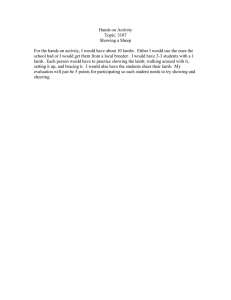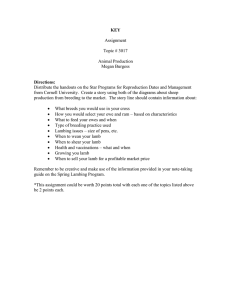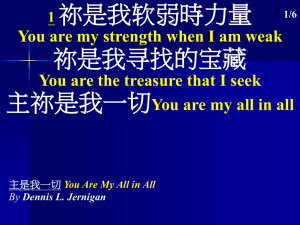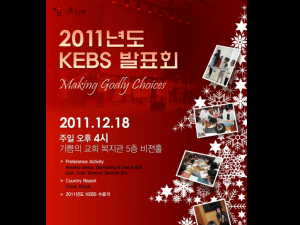Homily Easter 6C Acts 16:9-15 May 9, 2010
advertisement
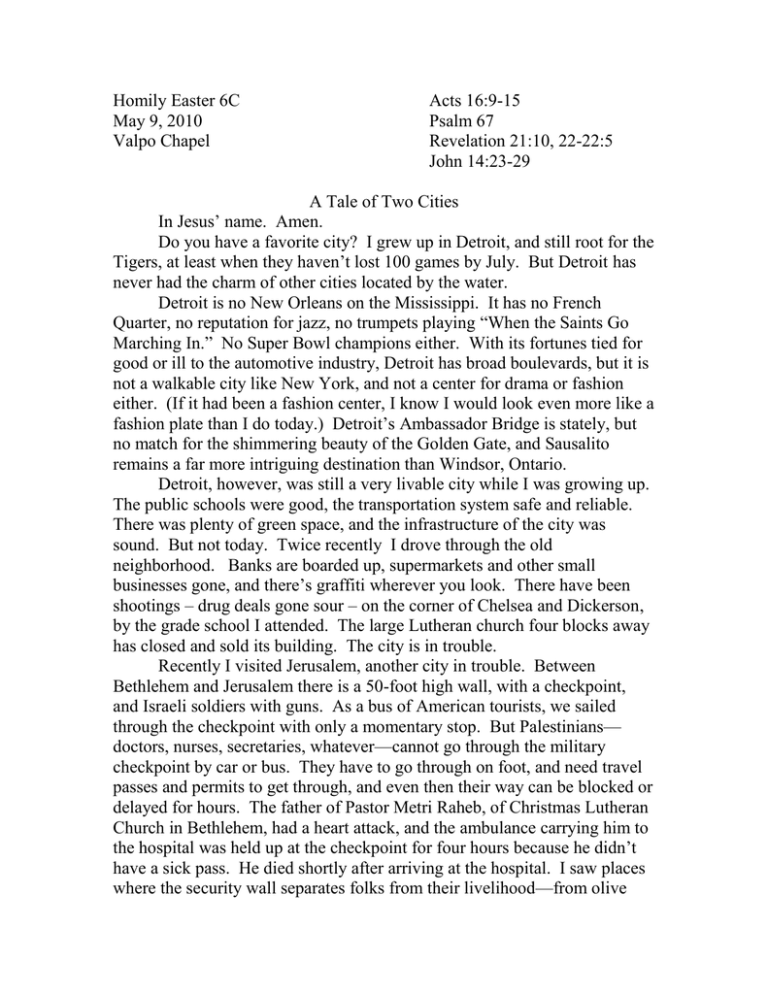
Homily Easter 6C May 9, 2010 Valpo Chapel Acts 16:9-15 Psalm 67 Revelation 21:10, 22-22:5 John 14:23-29 A Tale of Two Cities In Jesus’ name. Amen. Do you have a favorite city? I grew up in Detroit, and still root for the Tigers, at least when they haven’t lost 100 games by July. But Detroit has never had the charm of other cities located by the water. Detroit is no New Orleans on the Mississippi. It has no French Quarter, no reputation for jazz, no trumpets playing “When the Saints Go Marching In.” No Super Bowl champions either. With its fortunes tied for good or ill to the automotive industry, Detroit has broad boulevards, but it is not a walkable city like New York, and not a center for drama or fashion either. (If it had been a fashion center, I know I would look even more like a fashion plate than I do today.) Detroit’s Ambassador Bridge is stately, but no match for the shimmering beauty of the Golden Gate, and Sausalito remains a far more intriguing destination than Windsor, Ontario. Detroit, however, was still a very livable city while I was growing up. The public schools were good, the transportation system safe and reliable. There was plenty of green space, and the infrastructure of the city was sound. But not today. Twice recently I drove through the old neighborhood. Banks are boarded up, supermarkets and other small businesses gone, and there’s graffiti wherever you look. There have been shootings – drug deals gone sour – on the corner of Chelsea and Dickerson, by the grade school I attended. The large Lutheran church four blocks away has closed and sold its building. The city is in trouble. Recently I visited Jerusalem, another city in trouble. Between Bethlehem and Jerusalem there is a 50-foot high wall, with a checkpoint, and Israeli soldiers with guns. As a bus of American tourists, we sailed through the checkpoint with only a momentary stop. But Palestinians— doctors, nurses, secretaries, whatever—cannot go through the military checkpoint by car or bus. They have to go through on foot, and need travel passes and permits to get through, and even then their way can be blocked or delayed for hours. The father of Pastor Metri Raheb, of Christmas Lutheran Church in Bethlehem, had a heart attack, and the ambulance carrying him to the hospital was held up at the checkpoint for four hours because he didn’t have a sick pass. He died shortly after arriving at the hospital. I saw places where the security wall separates folks from their livelihood—from olive groves that have been in the family for hundreds of years. Residents of Jewish settlements – high rise condominium developments built on Palestinian land – travel in and out of Jerusalem on special highways built just for them. And at the gates of the old city of Jerusalem? Israeli soldiers are stationed with their automatic weapons slung over their shoulders, at the ready. In Revelation, the Holy Spirit gives John a vision. It is the fulfillment of all our yearnings for the holy city of Jerusalem, for Detroit, and for all our cities on earth. For Valparaiso, and the city or town or village some of you will soon go home to, or the new place where you will take up residence after graduation. What John sees is the heavenly Jerusalem, a “new” Jerusalem, descending to earth. It comes without a temple, because it doesn’t need one any longer, for God and the Lamb dwell among mortals. It has no need for moon light or sun light or street lights to illumine dark alleys or the corner of Chelsea and Dickerson in Detroit, because “the glory of God is its light, and its lamp is the Lamb.” This new Jerusalem will no longer need the security fence Israel has erected, nor its checkpoints with armed guards, for the city gates will be open 24/7, and the nations will stream in. Flowing from the throne of God and of the Lamb is “the river of the water of life,” and on “either side of the river…the tree of life,” without any barren season, producing 12 kinds of fruit that even Harry and David can’t come close to matching. And “the leaves of the tree,” Revelation tells us, “are for the healing of the nations.” So what do we make of John’s vision and of this tale of two cities? This tale of city life as it is now in Detroit and Jerusalem, and this tale of the new Jerusalem where God’s light shines perpetually upon God’s people, and the darkness – inside us and out – no longer has the power to engulf and overwhelm us? We yearn like John’s original audience for a city and a time when God will fully dwell with God’s people, when the forces of evil and the powers of this world will no longer hold sway. But John’s vision is not of some hoped for tomorrow, but of today. As one theologian has pointed out, if we check the Greek verbs in this text, “The Holy City is not future perfect, it’s present tense. Now the Holy City is descending. Now God is making all things new….Now! There’s nothing otherworldly about the vision: It’s happening now in the midst of our worn, torn, broken world. And with the eyes of faith, [we] can see it happen.”1 1 David Buttrick, Imaging the Word, Volume One, p. 203. And more than that, not only can we see it happen; we are part of the happening, part of the way people – people divided and diseased and hungry and hurt and in the dark – experience the presence of God with them today. How can we be a sign of God’s presence for others? Today is Mother’s Day, and many of us remember our mothers in gratitude for being “homemakers,” not just homemakers in the sense of their dusting and doing the laundry, and making our meals. But for their making the place we lived not just a space for a collection of individuals to inhabit, but for their making it a “home,” a community of care where we received balm and kisses on our skinned knees, had our deeper wounds cleaned and bandaged and all that we brought home each day, our successes and failures, covered in love. In today’s Gospel another “homemaker” is mentioned. “I and the Father will make our home with you,” Jesus says. No matter how messy the interior of our life, God chooses to create a home in us. And the Holy Spirit is with us too, stays alongside us, Jesus promises, to comfort and strengthen and encourage us, and to remind us of our calling: to love one another, as Jesus has first loved us, and to share with others the peace of Christ, that peace the world cannot give. And that’s what we do, we who have been baptized in the river of the water of life. Lutheran theologian Barbara Rossing says that “the Greek word John uses [for lamb] is …the diminutive form, a word like ‘lambkin,’ ‘lamby,’ or ‘little lamb’ ….The depiction of Jesus as a Lamb [like this] shows him in the most vulnerable way possible, as a victim who is slaughtered but standing, that is crucified but risen to life.” Rossing goes on, “From beginning to end, Revelation’s vision of the Lamb teaches a ‘theology of the cross.’…Evil is defeated not by overwhelming force of violence but by the Lamb’s suffering love on the cross.”2 From baptism on, we carry the Lamb’s name on our forehead, following him with lives of self-giving, violence-subverting love. And what we have gathered here again to do this Sunday—to worship and to sing, “Worthy is Christ, the Lamb who was slain”—is turning on the switch to Lamb power. For in “Revelation,” Rossing says, “we sing our way into God’s new vision for our world.”3 Isn’t that a way to describe the goal of the Valpo experience, what we hope students find here? Singing and serving “our way into God’s new vision for our world,” turning on the switch to Lamb power? That’s exactly what the Valpo Chorale did earlier this spring, collecting donations for Haiti 2 Barbara R. Rossing, The Rapture Exposed: The Message of Hope in the Book of Revelation, p.111. 3 Ibid., p.110. during their concert tour of Midwestern states. It’s what SALT, Valpo’s Social Action Leadership Team, is all about – “home making” in service projects in Appalachia and New Orleans and raising funds to build a casa, a home, for orphans in Nicaragua. In one of the reflections by seniors this week in morning prayer, James Nagel spoke about working on an Engineers without Borders project in Tanzania, in the shadow of Mt. Kilimanjaro -building a canal to bring fresh water to an isolated village in Tanzania. Isn’t this a part of John’s vision of the river of the water of life flowing from the throne of God and the Lamb? And right here in Valparaiso? In this city is the world’s peace, where underneath the surface at the high school and elsewhere are racial discord and tension. But the university chapel has joined with other churches in town to sign a joint statement against racism on Pentecost Sunday, and VU’s President and Valparaiso’s Mayor this week announced a summit this fall to more fully address this issue. Like the Lamb-kin who emptied himself and made himself vulnerable even unto death, we too stand with those who are victims. In the Garden of Eden, after the Fall, Adam and Eve sewed fig leaves together to cover their shame. In an act of grace, God later “made garments of skin for the man and his wife, and clothed them.” That is what God has done with all our shame and sin, and failings, too, made in Jesus Christ a garment of skin for us, covered us up in his grace, and clothed us in Christ’s own righteousness. The tree of life for us is that bare and bloody tree-hewn cross on the outskirts of Jerusalem. Somehow, by the Spirit’s power, we are branches and leaves of that tree of life, in which there is healing for the nations, and for our cities, for our families and for ourselves, in all those things we still struggle with. So, before we leave here today, let’s once again, turn on the switch to Lamb power, and “sing our way into God’s new vision for our world.” In Jesus’ name. Amen.
